The Austrian authorities admitted on Wednesday that, months before Monday’s terrorist attack on Vienna, they received warning from Slovakia that the gunman had been trying to buy ammunition.
Kujtim Fejzulai, a 20-year-old dual citizen of Austria and North Macedonia, fired at crowds at six different locations in the city center in the Austrian capital on Monday evening, killing an elderly man, an elderly woman, a young passer-by, and a waitress, and wounding 22 others, before he was shot dead by police.





